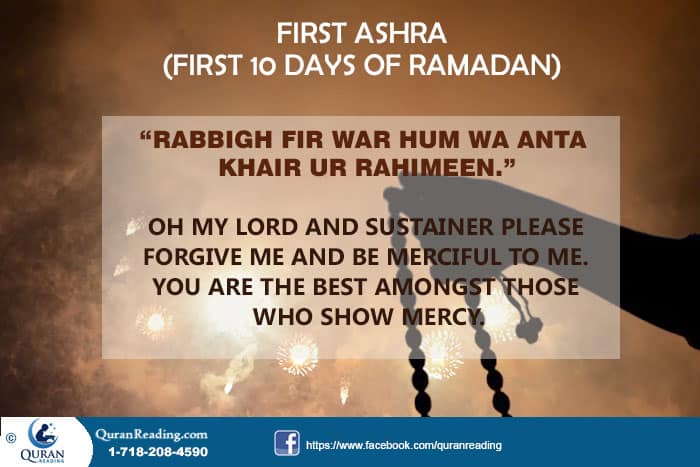
Attaining Mercy In The First 10 Day (First Ashra) Of Ramadan

The Holy Month of Ramadan is categorized into three divisions called Three Ashras. Every division comprises of 10 days and is called ‘Ashra’. All the three Ashras of Ramadan have their own specialty and on the bases of that specialty, Muslims make according supplications for each month and try to focus their attention on the respective virtues that come with a particular Ashra.

The First Ashra of Ramadan is of Mercy and a Muslim is supposed to seek mercy of Allah Almighty in this month. With every prayer, Quran recitation and Nafal prayer, the objective of a Muslim should be to invoke Allah Almighty for His mercy. In one of Hadith Qudsi, it is narrated that Allah says:
“O son of Adam! However much you call upon Me and place your hopes in Me, I will forgive you without any reservation. O son of Adam! If you have sins piling up to the clouds and then ask My forgiveness, I will forgive you without any reservation. O son of Adam! If you come to me with enough mistakes to fill the Earth, and meet Me without associating anything as a partner with Me, I will come to you with enough forgiveness to fill the Earth.” (Tirmidhi)
From this hadith it is clear that forgiveness from Allah Almighty is perhaps His biggest and greatest mercy. Therefore, when in the first Ashra of Ramadan, it is actually the seeking of forgiveness that presents itself in the form of mercy.
From the hadith it also becomes clear that Allah’s mercy in the form of forgiveness knows no bounds, rather it is always present and available for everyone and a Muslim must try seeking it and ask for it in any case and any situation possible, especially during Ramadan.
The lines below discuss the way a Muslim must ask for the mercy of Allah Almighty during the first ten days of Ramadan.
Supplicate:
Perhaps the best method of invoking Allah Almighty and asking for His blessings and mercy in the first ten days of Ramadan is supplicating in front of Allah Almighty. When a Muslim supplicates to Allah Almighty it means that he or she is aware of the fact that only He is the one who can fulfill their desires and He is the Only Lord worthy of worship. In Quran, Allah Almighty instructs Muslims to seek mercy and forgiveness in the following way:

“O My Lord, forgive me and have mercy upon me for You are the best of the merciful.” (23:118)
From this ayah of Quran, it is clear that a Muslim must seek mercy and forgiveness from Allah Almighty as only He is the one Who is the Best Merciful. Therefore, when it comes to mercy there is no need of searching for anyone else, as the Supreme form it is with Allah Almighty.
Supplicating to Allah Almighty excessively in the first ten days of Ramadan is actually a way of remembering Him. For those who remember Him, for them Allah says:

“So, Remember Me, and I will remember you.” (2:152)
Therefore, when a Muslim supplicates in the first ten days of Ramadan, he or she actually remembers Allah Almighty, and when they remember Him, He also remembers them by showering His mercy and blessings upon them. Besides this, there are several other supplications you can do in the holy month of Ramadan. For that, you can download Ramadan Duas app for your smartphone to have all those prayers in your smartphone.
Fasting As Mercy:
If one sees from a keener perspective, then one ultimately reaches the conclusion that the act of fasting in itself is a Mercy from Allah Almighty. In Quran, Allah Almighty says:

“O you who have believed, decreed upon you is fasting as it was decreed upon those before you that you may become righteous.” (2:183)
From this ayah of Quran it is clear that the objective of fasting in Ramadan is to make a person righteous and on the path of virtue. This seeking and attaining of righteousness in itself is a mercy of Allah Almighty, therefore, when a person undergoes fast, actually he or she progresses towards righteousness, and this pavement towards righteousness which is laid down as an obligation for Muslims is actually what makes fasting a mercy. Therefore, in the first ten days of Ramadan a Muslim must keep all the fasts with enthusiasm and the hope of attaining righteousness with the aid of mercy of Allah Almighty.
Worship More:
Another and perhaps one of the most popular ways of achieving mercy of Allah in the first ten days of Ramadan is worshiping Allah Almighty more than what a Muslim does in the normal days. In Quran, Allah Almighty says:

“I did not create the jinn and mankind except to worship Me.” (51:56)
From this ayah one of the purposes of creation of mankind is clear, as per which the humans are created to worship Allah Almighty. Therefore, those who worship Him come under His umbrella of mercy and blessings.
A Muslim must worship Allah Almighty in the first ten days of Ramadan in every way possible. This worshiping can include the daily prayers, the Taraweeh prayer at night, the recitation of Holy Quran throughout the day whenever time is available and His praise in the form of Tasbeeh. Therefore, a Muslim must adopt every way possible pertaining to worshiping Allah Almighty so that he or she could receive the mercy in abundance.
Conclusion:
In a nutshell, Ramadan is the Holiest of months in the Islamic calendar and the sanctity and grandeur of it starts with the first fast and continues till the last one. Therefore, to gather mercy in the first ten days of Ramadan, a Muslim must resort to worship, fasting, and supplication.





